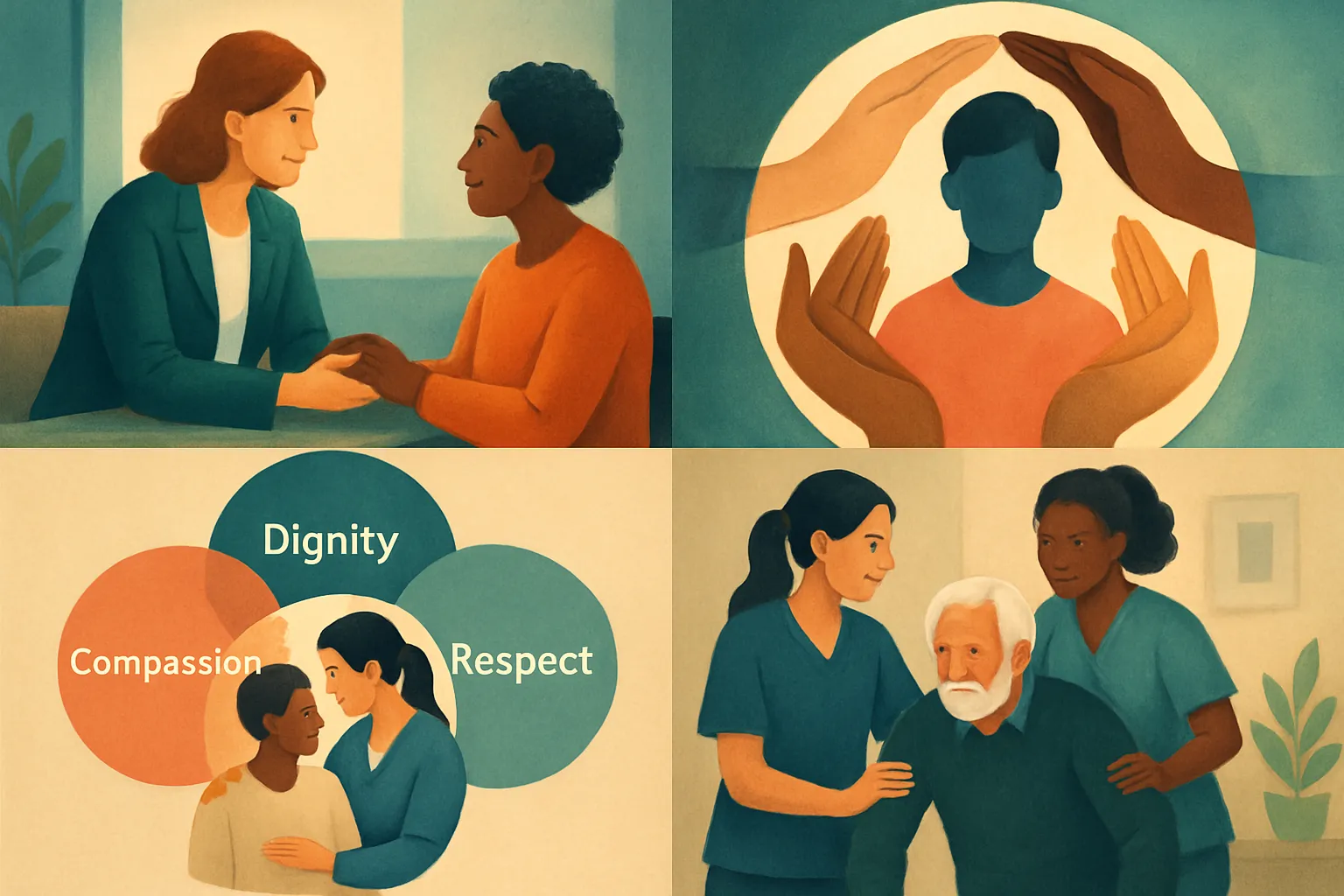Curriculum
- 15 Sections
- 15 Lessons
- 2 Weeks
- Understanding Your Role2
- Duty of Care2
- Equality and diversity2
- Person-centred care and empowerment2
- Communication2
- Privacy and dignity2
- Fluids and nutrition2
- Awareness of mental health, dementia and learning disabilities2
- Safeguarding adults2
- Safeguarding children2
- Basic life support2
- Health and safety2
- Handling information2
- Infection prevention and control2
- Understanding learning disabilities and autism2
Curriculum
Person-centred care and empowerment
Learning Objective:
Explore the fundamentals of person-centred care and empower healthcare workers with essential skills to meet individual needs.
Principles of person-centred care

Person-centred care is a holistic approach that prioritizes the individual above all else, focusing on tailoring support to meet their unique needs. It embraces values such as empathy, dignity, individuality, and respect, ensuring that care is not only about physical health but also addresses emotional, social, and personal preferences. This approach deeply aligns with phrases like “putting the individual at the centre” and emphasizes the need to “tailor care to meet unique needs.” Understanding these principles is vital in promoting well-being and satisfaction in health and social care settings.
What is Person-Centred Care?
Person-centred care means treating patients as individuals and with dignity and respect. This care model adapts solutions to each person, considering their preferences, needs, and values. By valuing individuality and respecting choices, care workers enhance overall care quality.
Benefits and Impact on Care Quality
The benefits of person-centred care include improved health outcomes, greater patient satisfaction, and enhanced quality of life. This model fosters a supportive environment that cultivates trust and collaboration between caregivers and patients, resulting in more effective care plans and adherence to treatments.
- Empathy
- Respect
- Equity
Understanding and sharing the feelings of another to provide genuine, compassionate care.
Honoring an individual’s choices and autonomy, which is fundamental in care delivery.
Recognizing and valuing personal preferences, needs, and each person’s unique identity.
Developing care plans

A care plan is a detailed, dynamic framework created based on an individual’s specific needs, preferences, and goals. It plays a central role in person-centred care by involving shared decision-making and co-producing with the person receiving care. Central to care plans are the terms “individualised goals” and “integrated support,” which ensure each care plan is as unique as the person it supports, reflecting their life choices and ensuring that care interventions are aligned with their aspirations.
- Assessment of Needs
- Setting Goals
- Involving the Individual in Planning
- Review and Revision
Start by thoroughly understanding the individual’s preferences, challenges, and strengths to inform care decisions.
Collaborate with the person to establish achievable and meaningful goals that align with their desires and priorities.
Engage the individual meaningfully in creating the plan, ensuring their voice is at the heart of decision-making.
Regularly review and adapt the care plan to reflect changes in the person’s condition, needs, and preferences.
Involving family and carers

Involving family and carers in person-centred care is crucial for providing comprehensive and continuous support. A collaborative partnership with family members and carers offers insights into the individual’s preferences and history, ensuring a more integrated support network. This collaboration aids in maintaining continuity of care, provides additional perspectives, and strengthens shared responsibility among all involved, enhancing the overall care experience.
What are the key components of personalized care and relationship building in support plans?
- Foundation of Individualized Support
- Cornerstone of Personal Care
- Key Aspect of Relationship Building
- Central to Dynamic Care Plans
Person-Centred Care Plan
Respecting Choices
Collaborative Partnership with Family
Shared Decision-Making